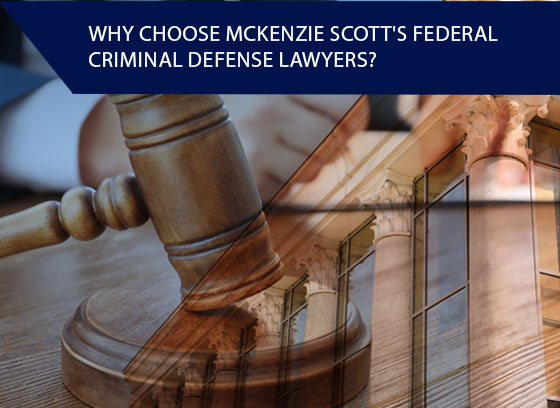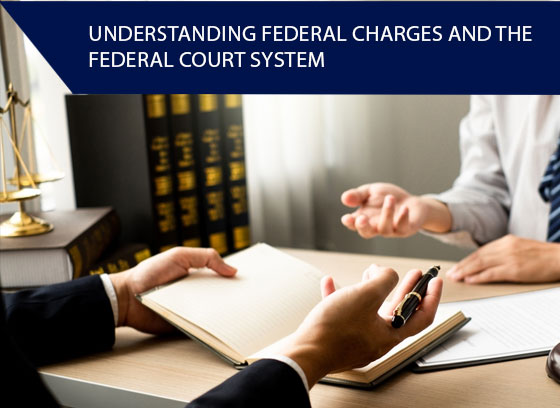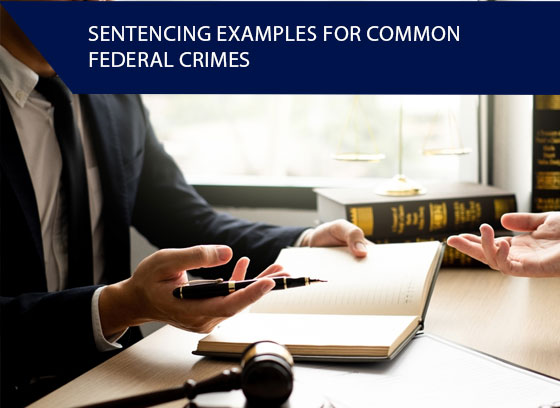Providing the Best Federal Criminal Defense Attorney Representation
- Are you facing federal charges?
- Are you the target of a criminal investigation or grand jury?
Hiring the best federal criminal defense attorney to battle the government is probably the most critical decision you can make. Your liberty, family, and livelihood depend on it.
The federal criminal legal system is a labyrinth of complex laws and procedures, and it is incredibly high stakes. Prosecutors vigorously pursue convictions at all costs and federal sentencing can be brutal. For these reasons, the gravity of a federal prosecution can feel overwhelming. Having a team of federal trial lawyers who are experienced in the nuances of federal criminal law is paramount to ensuring that your rights are protected, and that justice is served.
At McKenzie Scott, our elite criminal defense team specializes in navigating the intricate federal court system and successfully defending clients from serious charges that can have life-altering consequences.

Client Review
"Mr. Scott and Mr. Bourassa helped our family tremendously. We were able to meet with the team immediately to address important matters. I was very comfortable with them and their concern for my family’s welfare. Our very stressful time ended up without consequence because of the effort they put into the case. Ultimately our day in court never came and no charges were made. I am thankful to have chosen this team and I would definitely recommend to others needing defense attorneys."
April

 The United States criminal legal system consists of two separate sovereigns that can address violations of criminal law:
The United States criminal legal system consists of two separate sovereigns that can address violations of criminal law:
- State courts;
- Federal courts.
- Licensed to practice in federal courts;
- Comprehensive understanding of federal rules and laws;
- Hard-earned experience successfully defending federal cases-and especially in federal criminal trials.
- Over 90 years of combined experience handling federal criminal cases;
- Well over 100 federal criminal trials (approximately three-quarters of which have resulted in acquittals, hung juries, or reversals on appeal);
- Successfully defending countless clients facing all types of federal charges;
- Decades previously serving at the community defender organization for the Southern District of California (Federal Defenders of San Diego, Inc.);
- Dozens of successful appeals before the Ninth Circuit Court of Appeals;
- Unparalleled results pretrial, earned by combining: proven, cutting-edge legal strategies; aggressive and innovative motions practice; tireless investigation and workup; with an unwavering commitment to each and every client.
McKenzie Scott’s founding partners – Michele Akemi McKenzie and Tim Scott – began their careers as trial attorneys with Federal Defenders of San Diego, Inc. For nearly two decades, Ms. McKenzie and Mr. Scott provided expert criminal defense representation for indigent clients, many of whom were charged with drug and immigration-related offenses. Their practices have since expanded to include white-collar defense, healthcare-related fraud allegations, and civil rights prosecutions in federal court. Their experience sets them apart as uniquely-trained and highly-dedicated federal criminal defense attorneys who maintain a robust private practice.
Their experience sets them apart as uniquely-trained and highly-dedicated federal criminal defense attorneys who maintain a robust private practice.
Additionally, McKenzie Scott trial attorneys Marcus Bourassa, Michelle Angeles, Lauren Mellano, and Brett Diehl served at Federal Defenders of San Diego, Inc., where they gained a wealth of experience:
- Trying-and winning-federal criminal trials;
- Appealing cases to the Ninth Circuit Court of Appeals/U.S. Supreme Court;
- Presenting novel constitutional challenges to federal prosecutions; and
- Presenting before California State Assembly’s Committee on Public Safety.
While many criminal defense attorneys choose to go directly into private practice, McKenzie Scott’s team takes great pride in its community-minded ethos and dedication to ensuring justice for all. We fight tirelessly to protect the accused.
Understanding Federal Charges and the Federal Court System
Federal charges are never a small matter. They often involve serious offenses that cross state lines, violate multiple federal laws, and require a complex defense strategy. 
Federal charges are never a small matter. They often involve serious offenses that cross state lines, violate multiple federal laws, and require a complex defense strategy.
McKenzie Scott’s criminal defense team handles all types of federal crimes. Some of the most common federal charges are brought as a result of allegations of:
- Drug trafficking;
- White-collar crimes (fraud, embezzlement, wire fraud, mail fraud, tax evasion, etc.);
- Cybercrime;
- Immigration offenses;
- Terrorism;
- Antitrust violations;
- Sex crimes;
- Insider trading;
- Money laundering;
- Insurance fraud;
- Honest services fraud;
- Illegal firearms possession;
- Drug manufacturing;
- RICO violations;
- Theft of trade secrets;
- Healthcare fraud;
- Solicitation to commit a crime;
- Murder.
Unlike state charges, federal cases are prosecuted in United States District Courts. These courts have their own set of rules, procedures, and sentencing guidelines.
The federal court system is structured in three tiers:
- U.S. District Courts (trial courts);
- U.S. Courts of Appeal;
- The U.S. Supreme Court.
Federal sentencing guidelines play a significant role in determining punishment for federal crimes. These guidelines are complex and can greatly impact the outcome of your case.
Federal Sentencing Guidelines Explained
The Federal Sentencing Guidelines provide a method for calculating the severity of an offense using a point system. These guidelines consider a host of factors, some of the most common including:
- The amount of money lost (in fraud or theft cases);
- The quantity of drugs involved (in drug-related cases);
- The defendant’s criminal history (in all cases).
By combining factors about the specific offense, victims, and circumstances of a case, the guidelines produce a total “offense level,” which is a numerical value assigned to a crime, purportedly based on its severity. This level, cross-referenced in a chart against the defendant’s criminal history (which generates its own point value and “Criminal History Category”), determines a suggested guideline range for an appropriate sentence.
For example, an offense level of 23 with a Category II criminal history (signifying a “moderate” criminal record) might result in a guideline range of 51-63 months in federal prison. While judges often sentence within this range, our experienced federal criminal defense attorneys can argue for lower sentences through “downward departures” or “variances.”

What is the typical sentence for a federal crime? The answer varies widely depending on the nature of the crime, the defendant’s criminal history, the sentencing judge, and a host of other factors. Here’s a general overview of some common federal crimes and correlating sentencing guidelines:
– Wire fraud (18 U.S.C. § 1343) and Mail fraud (18 U.S.C. § 1341): As two of the most prevalent federal crimes, these offenses share similar elements:
- Knowingly participating in a plan to defraud for financial gain;
- Making material statements or omissions that could influence someone to part with their money;
- Intent to defraud;
- Using wire or mail communication as an essential part of the scheme.
The maximum sentence for these crimes is 20 (or in some circumstances 30) years in federal prison, as stated in the statute. That statutory maximum is per count, however, and prosecutors almost never charge only one fraud count in an indictment. Judges consider a variety of factors when determining sentences for wire and mail fraud cases. Furthermore, the actual sentence often falls within the guideline range based on the offense level and criminal history calculating method mentioned in the previous section.
As trusted and proven federal criminal defense attorneys, McKenzie Scott’s team works to challenge these calculations, present evidence in mitigation, and argue for sentences below the guideline range when appropriate.
– Bank Fraud (18 U.S.C. § 1344): Bank fraud involves knowingly executing or attempting a scheme to defraud a financial institution. This can include obtaining funds, assets, or securities through fraudulent means. The penalties for bank fraud can be severe, with fines up to $1,000,000 and imprisonment for up to 30 years.
– Health Care Fraud (18 U.S.C. § 1347): Health care fraud encompasses various offenses related to defrauding health care benefit programs. This can include violations of the False Claims Act (18 U.S.C. § 287) and the Anti-Kickback Statute (42 U.S.C. § 1320a-7b). These cases often involve complex legal and regulatory issues. The minimum sentence for healthcare fraud is a fine or up to 10 years in prison.
– Securities Fraud (18 U.S.C. § 1348): Securities fraud involves knowingly executing or attempting a scheme to defraud in connection with securities transactions. This offense can result in fines and imprisonment for up to 25 years. Securities fraud cases often intersect with regulations under the Securities Exchange Act of 1934.
Federal minimum-mandatory sentencing refers to laws that require judges to impose a predetermined minimum prison term for specific crimes. These laws were introduced in the 1980s as part of the “tough on crime” era, with the ostensible goal of ensuring consistent punishments and deterring serious offenses.
While the intention behind these laws may have seemed to make sense at the time, their implementation has led to numerous unintended consequences, including overcrowding in federal prisons, exacerbated racial disparities in the criminal legal system, and limited judicial discretion in sentencing.
Judge Stephanos Bibas, who serves on the U.S. Court of Appeals for the Third Circuit, has noted that mandatory minimums dehumanize people by acting as “sledgehammers rather than scalpels.”
Statistics from the United States Sentencing Commission confirm that from 2019 to 2023, the average sentence length was:
- 151 months for those subject to the mandatory minimum penalty;
- 67 months for those receiving relief;
- 30 months for individuals who were not convicted of an offense carrying a mandatory minimum penalty.
Crimes that are commonly tied to mandatory minimum sentencing guidelines include:
- Drug offenses (64.7% of individuals sentenced were convicted of an offense carrying a mandatory minimum penalty);
- Identity theft offenses (80.7% of individuals sentenced were subject to a mandatory minimum penalty);
- Firearms offenses (28% of individuals sentenced were convicted of an offense carrying a mandatory minimum penalty);
- Sex offenses (70.9% of individuals sentenced were convicted of an offense carrying a mandatory minimum penalty).
All 50 states as well as the District of Columbia have mandatory minimum sentencing laws in place.
McKenzie Scott’s dedicated team of federal criminal defense attorneys plays a multifaceted role in every case:
- Arguing for bail and release to fight your case from a position of freedom;
- Researching and writing innovating and exhaustive motions attacking charges;
- Challenging sentencing guideline calculations;
- Arguing for sentences below the guideline range;
- Developing strategies to defend against federal charges;
- Ensuring clients understand the elements of their alleged offenses;
- Staying updated on changes in federal sentencing, such as those introduced by the First Step Act.
Understanding the nuances of federal criminal law is crucial for mounting an effective defense. Each case requires a thorough analysis of the facts and a deep understanding of the applicable laws and sentencing guidelines.
If you’re facing federal criminal charges in California, it’s essential to consult with an experienced federal criminal defense attorney as soon as possible. McKenzie Scott’s trial lawyers are here to help you navigate the complexities of the Federal Sentencing Guidelines and develop a strong defense strategy tailored to your case, which includes:
- Protecting your constitutional rights;
- Fighting to undermine the prosecution’s case at every turn;
- Negotiating with federal prosecutors when necessary;
- Representing you in federal trials and appeals.
Our lawyers have the experience and results to give you peace of mind throughout every step of the federal criminal defense process. We’re skilled at navigating federal court procedures and taking on prosecutors, ensuring that all possible advantages are utilized in your case.
Even before charges are filed, our federal criminal defense lawyers can play a role in protecting your rights. Securing expert criminal defense representation immediately allows our team to properly prepare a defense strategy, including advising you on how to handle interactions with federal agents and helping prevent you from inadvertently weakening your legal position.
The various phases of a federal criminal case may include:
– Pre-trial Proceedings and Plea Negotiations: Your attorney will review the evidence against you, file necessary motions, and (if desired) negotiate with prosecutors. If a plea deal is in your best interest, we’ll work to get the most favorable terms possible.
– Federal Trial Process: If your case goes to trial, our federal criminal lawyers will present your defense, cross-examine witnesses, and argue on your behalf. We’ll work to demonstrate reasonable doubt to secure an acquittal.
– Sentencing Phase: If a conviction is handed down, your attorney will advocate for the lowest sentence possible under federal sentencing guidelines.
– Federal Appeals Process: Judges and juries don’t always get it right. Sometimes mistakes are made. If necessary, our trial lawyers can file appeals to higher courts, challenging any legal errors made during your trial.
Benefits of Hiring an Experienced Federal Criminal Defense Lawyer
The advantages of having McKenzie Scott’s elite team of federal criminal defense attorneys on your side cannot be overstated:
- We understand the nuances of federal law and can spot potential defenses to secure an acquittal;
- We have resources to conduct thorough investigations and challenge the prosecution’s evidence;
- We have the experience to handle complex white-collar criminal charges that require specialized knowledge;
- We’re well-versed at developing criminal defense strategies to minimize potential consequences (even if a conviction is likely).
What to Look for When Choosing a Federal Criminal Defense Attorney
Not all lawyers are created equal. When searching for the best federal criminal defense attorney to handle your case, consider:
- Experience in federal cases similar to yours;
- Track record of success in federal court;
- Specialization in relevant practice areas;
- Communication skills and availability;
- Reputation among peers and clients.
When you sit down with our attorneys for a case review, do not hesitate to inquire about our experience and approach to cases like yours. Your future may depend on the skills and dedication of the federal criminal defense attorney you hire.
Facing federal charges is harrowing. But with the right team of litigators by your side, you’re not alone. McKenzie Scott’s team will fight for your rights, guide you through the complex federal court system, and work tirelessly to secure the best possible outcome for your case.
Remember, time is of the essence in federal criminal cases. If you’re under investigation or have been charged with a federal crime, seek our expert legal representation promptly. Your rights and your future are worth protecting.
Frequently Asked Questions About California Insurance Fraud
How is a federal crime different from a state crime?
Federal crimes violate U.S. statutes and are prosecuted in Federal courts. State crimes violate state laws and are tried in State courts. Federal crimes often involve offenses that cross state lines or affect national interests. As discussed below, some offenses, like drug crime and firearm offenses, can be prosecuted in both federal and state courts.
Can a crime violate both federal and state laws?
Yes. In fact, serious crimes commonly violate both federal and state laws. In such instances, the arresting agency typically determines whether the case is heard in Federal or State court. McKenzie Scott’s criminal defense attorneys have decades of experience handling cases in both State and Federal court.
Can any lawyer defend me in federal court?
No. In fact, typically only a criminal defense attorney admitted to practice in the Federal District Court where you are charged may represent you in your federal criminal case. Federal cases have unique procedures and laws that require specialized experience, skills, and knowledge.
What should I do if I’m contacted by federal investigators?
If federal agents contact you, politely decline to answer questions and inform them that you want to speak with an attorney. Then, contact McKenzie Scott’s federal criminal defense lawyers immediately by calling 619-794-0451. Don’t try to handle the situation on your own. Protect your rights by securing our expert defense team.
How long do federal criminal cases typically last?
The duration of a federal criminal case can vary widely, from several months to over a year. Complex cases, especially those involving white-collar crimes, can take even longer to resolve.
What are the potential consequences of a federal conviction?
Federal convictions often carry severe penalties, including substantial prison time, hefty fines, and long-term collateral consequences like loss of professional licenses or difficulty finding employment. The specific consequences may depend on the nature of the crime and the defendant’s criminal history.
Call McKenzie Scott, Federal Criminal Defense Attorney : (619) 794-0451.
Client Review
"I’m very grateful to Mr. Scott and his firm. We never felt like ‘clients.’ He viewed us as individuals of incalculable worth. He understood that we put the most difficult situation of our lives in his hands and he wasn’t going to let us down. It was obvious that Mr. Scott valued the truth and justice of our situation over his own ego. He is the farthest thing from the stereotypical attorney. Every attorney and paralegal in his office was equally qualified and motivated. Their work gave us peace of mind and confidence throughout the mediation and trial processes. They were extremely attentive to detail, and able to uncover significant details that we had not noticed despite being more intimately aware of the situation. They sifted through enormous amounts of data and properly distinguished the most important elements of the case from those of lesser importance. The storyline of our situation was patiently woven together over the course of the trial and the jury was not lacking any important elements. He was never too busy to answer a call, email or text. He was factual rather than emotional. Our trial ended more quickly and favorably than we anticipated as a result of Mr. Scott’s professional and human excellence."
Chris Ambuul

Schedule Your Free Consultation with a Federal Criminal Defense Attorney
FREE CASE EVALUATION
The information provided on this website is for informational purposes only; it is not intended to create an attorney-client relationship with those accessing the website and the firm is not intending to provide any individuals with legal advice as to any particular matter. Additionally, prior results achieved by the firm do not represent a guarantee or prediction of similar results in any other cases. The facts of each case are unique. This website may contain attorney advertising.
@ Copyright 2025 McKenzie Scott Civil Rights & Criminal Defense Lawyers. All Rights Reserved | Sitemap
